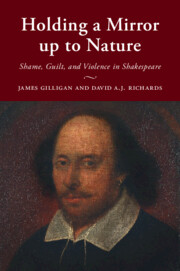Book contents
- Holding a Mirror up to Nature
- Holding a Mirror up to Nature
- Copyright page
- Dedication
- Epigraph
- Contents
- Introduction
- Chapter 1 Shame and Guilt in Personality and Culture
- Chapter 2 The Cycle of Violence in the History Plays
- Chapter 3 Fathers and Mothers
- Chapter 4 Make War, Not Love
- Chapter 5 The Motives of Malignity
- Chapter 6 Moral Nihilism and the Paralysis of Action:
- Chapter 7 Apocalyptic Violence
- Chapter 8 Transcending Morality, Preventing Violence
- Chapter 9 The Form and Pressure of Shakespeare’s Time and Ours
- Acknowledgments
- Bibliography
- Index
Chapter 6 - Moral Nihilism and the Paralysis of Action:
Hamlet and Troilus and Cressida
Published online by Cambridge University Press: 25 November 2021
- Holding a Mirror up to Nature
- Holding a Mirror up to Nature
- Copyright page
- Dedication
- Epigraph
- Contents
- Introduction
- Chapter 1 Shame and Guilt in Personality and Culture
- Chapter 2 The Cycle of Violence in the History Plays
- Chapter 3 Fathers and Mothers
- Chapter 4 Make War, Not Love
- Chapter 5 The Motives of Malignity
- Chapter 6 Moral Nihilism and the Paralysis of Action:
- Chapter 7 Apocalyptic Violence
- Chapter 8 Transcending Morality, Preventing Violence
- Chapter 9 The Form and Pressure of Shakespeare’s Time and Ours
- Acknowledgments
- Bibliography
- Index
Summary
Hamlet dramatizes a problem that began during Shakespeare’s lifetime, when the scientific revolution was replacing the cognitive basis of the Medieval world, faith (in God and the devil, good and evil, ghosts and witches), with that of modernity, which bases knowledge on doubt: take nothing on faith, believe only what you can prove or disprove with empirical evidence. This paralyzed Hamlet, for he could not find a credible answer to his question, “What should I do?,” since no empirical test can prove what one should do. For him “the time [was] out of joint,” for both shame and guilt ethics had lost their credibility, yet he knew of no credible alternative. The resulting moral nihilism made him unable to organize his behavior, which is incompatible with ongoing life, as the play shows. Troilus and Cressida shows the same problem, which still haunts the modern world.
Keywords
- Type
- Chapter
- Information
- Holding a Mirror up to NatureShame, Guilt, and Violence in Shakespeare, pp. 94 - 107Publisher: Cambridge University PressPrint publication year: 2021

